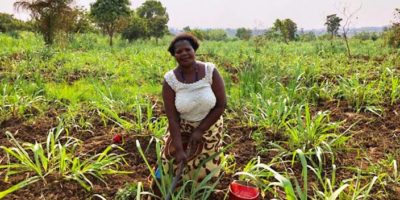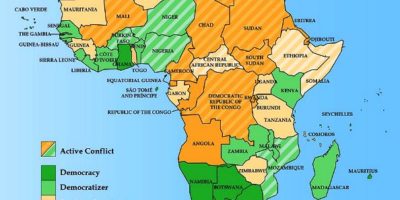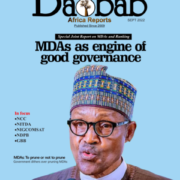For African countries to benefit from the transition to sustainable green economies, which is estimated to generate $3 trillion by 2030, innovative instruments to foster climate action and address the current debt crisis are needed.
Government and institutional representatives at the opening of the Ministerial segment of the 56th Session of the Conference of Ministers of Finance, Planning and Economic Development in Victoria Falls, Zimbabwe made a resounding call for a broad range of innovative instruments such as debt-for-nature swaps, regional blue bonds, regional carbon markets and the use of natural capital accounting.
Emmerson Mnangagwa, President of the Republic of Zimbabwe, said, “The effects of climate change are increasingly constraining African countries from exploiting their rich natural resource endowments, in a sustainable manner, leading to diminishing returns along economic value chains. The adoption of multi-pronged pathways is thus crucial for inclusive green economies. These must not only aid in poverty eradication, but also safeguard ecological thresholds that support human development, health and well-being.
“African countries should therefore innovate ways of climate financing mechanisms, proactively mobilize financial resources from both domestic and international sources to facilitate the adaptation,” he said.


He added that there is need for cooperation and partnership between governments and the private sector to forge the growth investment strategies for inclusive green economies that benefits our communities and stressed the need to focus on a people centred development philosophy that leaves no one and no place behind; one that builds synergies among nations and promotes balanced development across the continent.
Claver Gatete Executive Secretary of the Economic Commission for Africa (ECA) said Africa stands at a pivotal moment, facing many obstacles like food insecurity, fiscal constraints, escalating debt burdens and the adverse effects of climate change.
“It is important for countries to accelerate their regional integration initiatives through the full implementation of the African Continental Free Trade Area and the Single African Air Transport Market to drive competitiveness and reduce the cost of doing business across the continent,” said Mr. Gatete.
He noted that African debt has increased by over 180 per cent since 2010, and twenty-one countries are now at risk of, or in, debt distress. This is notwithstanding the annual loss of at least 5 per cent of GDP because of climate change.
The global financial architecture, he said, needs to be fixed. To work for everyone and reflect the new dynamics and hopefully the recent membership of the African Union in the G20 will resolve this.
“The conversations on governance and conditionalities, no matter how difficult, must be top priority. The ambitious $500 billion SDG Stimulus call by the United Nations Secretary-General is a recognition of how far we must go for justice and equity,” he said adding that the issue of unfair risk perceptions and credit ratings that offer Africa limited borrowing options must be addressed.
“We should not accept that only two African countries have investment grade rating, and 22 countries are unrated.”
The ECA Executive Secretary noted that countries should focus on deepening domestic resource mobilisation for sustainability.
“External borrowing has become costly, unreliable, and untenable. Therefore, reforming our tax systems and derisking the business environment are unavoidable imperatives. There is need to invest in capital market development to provide long-term resources for private sector investment,” he said.
Monique Nsanzabaganwa, Deputy Chairperson of the African Union Commission said Africa is navigating the delivery of its blueprint agenda 363 in global environments, causing tremendous challenges to African economies, with ripple effects on social political spaces as well.
“We need to continue to explore synergies that will pull national, regional and Continental resources through investment in Africa and Stock Exchange in order to secure long term financing of agenda 2063,” said Ms. Nsanzabaganwa adding that countries should enhance the role of the private sector as a source of green financing.
“Our policies must amplify the impact of capital to ensure that Africa’s private stock of assets contributes to green transition and inclusive development,” she said.
Mthuli Ncube, Minister of Finance and Investment Promotion, Republic of Zimbabwe for his part said limited fiscal space, increasing public debt, economic fragility, conflict, insecurity in some parts of Africa, and the negative impact of climate change are some of the biggest challenges the continent is facing today.
“Domestic resource mobilization is a crucial source of finance for progress to the establishment of the single African Air Transport market to promote movement of people and goods across Africa,” said Mr. Ncube.
“Countries should implement the African continental Free Trade Area agreement (AfCFTA) to stimulate manufacturing and increase trade on the continent.”
He said that resource mobilization and economic strategies emanating from the conference will help countries strengthen their policies minimize the negative impact of climate change.
Rebecca Amuge, Ambassador of the Republic of Uganda to Ethiopia and Chair of the outgoing Bureau said to fund sustainable development objectives, countries must invest in inclusive green transition priorities, harnessing innovative financing mechanisms, and leveraging Africa’s abundant natural resources. This necessitates not only the adoption of green policies but also the reform of the global financial architecture to reduce Africa’s debt burden and facilitate inclusive economic growth.




















